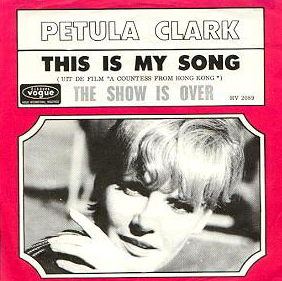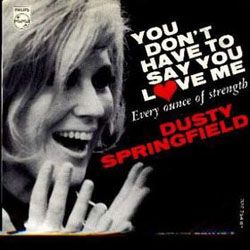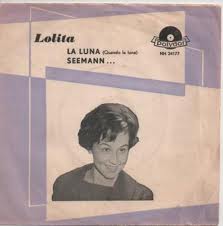Related Research Articles

Petula Sally Olwen Clark, CBE is a British singer, actress, and composer with one of the longest serving careers of a British singer, spanning more then 7 decades. To date Clark has sold more than 68 million records.

"Downtown" is a song written and produced by Tony Hatch which, as recorded by Petula Clark in 1964, became an international hit, reaching number one on the Billboard Hot 100 and number two on the UK Singles Chart. Hatch received the 1981 Ivor Novello award for Best Song Musically and Lyrically.

"This Is My Song" is a song written by Charlie Chaplin in 1966, and performed by Petula Clark.

Michelle Wright is a Canadian country music artist. She is one of the country's most widely recognized and awarded female country singers of the 1990s, winning the Canadian Country Music Association's Fans' Choice Award twice. In 2011, Wright was inducted into the Canadian Country Music Hall of Fame.

"My Love" is a 1965 single release by Petula Clark which, in early 1966, became an international hit, reaching No. 1 in the US: the track continued Clark's collaboration with songwriter and record producer Tony Hatch.

"Anyone Who Had a Heart" is a song written by Burt Bacharach (music) and Hal David (lyrics) for Dionne Warwick in 1963. In January 1964, Warwick's original recording hit the Top Ten in the United States, Canada, Spain, Netherlands, South Africa, Belgium and Australia.

"I Couldn't Live Without Your Love" is a 1966 single written by Tony Hatch and Jackie Trent and recorded by Petula Clark. It was inspired by the affair the songwriters were having at the time. Clark has cited "I Couldn't Live Without Your Love" along with "Don't Sleep in the Subway" as her favorites of her hits. “I still love that one; I do it onstage with great joy,” Clark told the "Montreal Gazette" in 2017.

"You're My World" is a ballad originally recorded in 1963 as "Il mio mondo" by Umberto Bindi, who co-wrote the Italian version with Gino Paoli. Subsequently, an English version was commissioned, and the lyrics were written by Carl Sigman as "You're My World". The song reached No. 1 in Australia (twice), Belgium, Mexico, Netherlands, South Africa and United Kingdom in recordings by Cilla Black, Daryl Braithwaite, Guys 'n' Dolls and Helen Reddy. Black's and Reddy's versions reached the US Top 40 in 1964 and 1977, respectively. The song also reached No. 1 in France and Spain in the respective translations "Ce monde" and "Mi Mundo", both sung by Richard Anthony.
"Long Live Love" is a Chris Andrews composition which, in 1965, gained Sandie Shaw the second of her three UK number one hit singles.

"I Don't Know How to Love Him" is a song from the 1970 album and 1971 rock opera Jesus Christ Superstar written by Andrew Lloyd Webber (music) and Tim Rice (lyrics), a torch ballad sung by the character of Mary Magdalene. In the opera she is presented as bearing an unrequited love for the title character. The song has been much recorded, with "I Don't Know How to Love Him" being one of the rare songs to have had two concurrent recordings reach the Top 40 of the Hot 100 chart in Billboard magazine, specifically those by Helen Reddy and Yvonne Elliman, since the 1950s when multi-version chartings were common.

"You Don't Have to Say You Love Me" is a 1966 hit recorded by English singer Dusty Springfield that proved to be her most successful single, reaching number one on the UK Singles Chart and number four on the Billboard Hot 100. Elvis Presley recorded a cover version in 1970 which was a hit in both the US and the UK. Other covers have charted in the UK, Ireland, Italy and Finland.
"Wedding Song " is a title of a 1971 hit single by Paul Stookey: the song—which Stookey credits to divine inspiration— has since been recorded by many singers —and remains a popular choice for performance at weddings.
"The Birds and the Bees" was a 1964 single release by Jewel Akens that is said to have been written by the twelve-year-old son of Era Records owner Herb Newman; the songwriting credit on the Jewel Akens recording of "The Birds and the Bees" reads Barry Stuart, which is the song's standard songwriting credit.

"Seemann " is a song originally written in German by Werner Scharfenberger and lyricist Fini Busch. A 1959 German-language recording by Lolita became an international hit in 1960–61.

"I'm Gonna Be Warm This Winter" is a 1962 single by Connie Francis, released in that December to peak at #18 on both the Billboard Hot 100 and the Cash Box Top 100. The song reached #22 UK in December 2008 via a remake by Gabriella Cilmi titled "Warm This Winter".

"You're the One" is a song by Petula Clark with lyrics by Tony Hatch, recorded in 1965. It was later also included on the 1965 album I Know a Place. "You're the One" was a Top 30 hit on the UK Singles Chart for Clark, but was more successful as a top ten US single release by The Vogues.

"Kiss Me Goodbye" is a Les Reed/ Barry Mason composition recorded in 1968 by Petula Clark.
"Amoureuse" is a French language composition by Véronique Sanson introduced on her 1972 album of the same name. Rendered in English the song became a hit single for Kiki Dee and – as "Emotion" – for Helen Reddy.

"When the Girl in Your Arms Is the Girl in Your Heart" is a 1961 hit by Cliff Richard written by the songwriting team of Sid Tepper and Roy Bennett who would contribute fifteen songs to the Cliff Richard canon including his career record "The Young Ones". Produced by Richard's regular producer Norrie Paramor, "When the Girl in Your Arms..." featured backing by the Norrie Paramor Orchestra. Richard's own group the Shadows backed him on the B-side "Got a Funny Feeling".
"Sailor" is the title of the English-language rendering of the 1959 schlager composition "Seemann " originally written in German by Werner Scharfenberger and lyricist Fini Busch : featuring lyrics in English by Norman Newell, "Sailor" would in 1961 afford Petula Clark her first UK #1 hit, simultaneously granting Top Ten success to Anne Shelton while also bringing her chart career to a close. Clark was also afforded international success with both her recording of "Sailor" and also with Marin the French-language rendering of the song.
References
- ↑ "The Originals by Arnold Rypens". Archived from the original on 21 June 2008. Retrieved 20 February 2009.
- ↑ "Chart For Week Up To 26 August 1961" . Retrieved 20 February 2009.
- ↑ "National Chart – France" . Retrieved 20 February 2009.
- ↑ "National Charts – European" . Retrieved 20 February 2009.
- ↑ "National Charts – Australia" . Retrieved 20 February 2009.